Bulgarian energy policy: "to make the square round"
Ralitsa Kovacheva, March 3, 2010
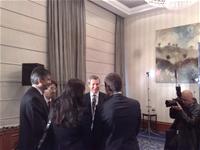 Nothing is decided until everything is decided. This saying fully describes the situation around the Belene project (for the construction of a second Bulgarian nuclear power station), for which each decision appears to be before last in the general context of the Bulgarian energy policy. And if anyone doubted that energy projects could be considered separately, outside geopolitical passions criss-crossing in Sofia, could sigh in relief. He or she was right, they cannot. And this became painfully clear during the Black Sea Energy forum in Sofia, organised by the US Atlantic Council.
Nothing is decided until everything is decided. This saying fully describes the situation around the Belene project (for the construction of a second Bulgarian nuclear power station), for which each decision appears to be before last in the general context of the Bulgarian energy policy. And if anyone doubted that energy projects could be considered separately, outside geopolitical passions criss-crossing in Sofia, could sigh in relief. He or she was right, they cannot. And this became painfully clear during the Black Sea Energy forum in Sofia, organised by the US Atlantic Council.
By 10 o'clock am on March 2nd it was known that Bulgaria would accept 2 bn euro Russian funding to continue the construction of Belene until a Western investor is found. This was officially announced on February 19th by the energy ministers of Bulgaria and Russia Traycho Traykov and Sergey Shmatko. It is true that Traykov did not explicitly say "we're taking the money" but he did not reject the offer either. Then he explained that there will be no state guarantees for the loan or corporate guarantees or, after all, this is not going to be exactly a loan. In the same time Russia celebrated the real chance of having its first nuclear power plant abroad.
10 days later the Bulgarian prime minister Boyko Borisov announced in determination that Belene cannot be built with Russian funding only. Journalists, expectedly, got excited by the change of position and started asking: will Sofia reject the offer for a Russian loan and what does the European Commission think about Russian funding?
Running through the corridor, Boyko Borisov refused to elaborate. And according to the energy minister Traycho Traykov, the problem is not that there are abrupt changes in the government's position, but that it is thinking aloud and this is obviously confusing the audience:
"The talks are going on ahead and backwards, we are looking for the best way to make the square round, but so far we have nothing signed on paper, we haven't reached this stage yet. The fact that we are so open and share all of our thoughts, I still think that this is the right approach. But in the same time you see how many problems this is creating for us".
By the end of March Bulgaria has to officially announce which is the most politically correct 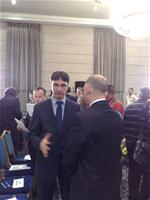 and economically lucrative possibility the project to be continued. Borisov warned that he would not hear even a word about freezing the project and stated 3 reasons:
and economically lucrative possibility the project to be continued. Borisov warned that he would not hear even a word about freezing the project and stated 3 reasons:
- the need Bulgaria to be able to demonstrate political succession and to send investors a message that it complies with its commitments;
- the loss of all the money already invested in the project, big defaults and the loans with high interest rates which the country will have to pay;
- the forthcoming closure of 5th and 6th reactors of the Kozloduy nuclear plant in 2020.
The government will start a procedure to extend the deadline for the closure of the reactors with another 10 and even 20 years but sooner or later they will have to be closed, Borisov further explained. This is why, together with the work on Belene, the plans for construction of additional 7th and 8th reactors at Kozloduy should be initiated. Similar idea was launched 2 years ago by the then-prime minister Sergey Stanishev (a socialist). After his visit to the US in 2008 Mr Stanishev even announced that there was American interest in investing in Kozloduy nuclear power plant but nothing happened since then. Obviously the idea is again gaining popularity because Borisov put it among its energy priorities together with Belene and South Stream.
And regarding the latter project, the positions of Bulgaria and the European Commission seem to be in full harmony for now. In his speech at the forum the Energy Commissioner Guenter Oettinger outlined the European vision of diversification like this:
"With regard to diversification, the EU would like to develop the Southern Corridor. We want a direct link to the Caspian region and the Middle East the way the Nord Stream connects the EU with our reliable partner Russia. We will support any gas pipeline which can achieve this goal, including Nabucco, White Stream, ITGI and TAP. We will not impede South Stream if it is in harmony with the community legislation".
 Later he specified that South Stream will get European support only if it responds to all technical security requirements. Oettinger emphasized on EU's wish to take part in Bulgaria's energy projects and, according to Mr Borisov, he personally committed to find an investor for Belene. In the next weeks an active dialogue between Bulgaria and the Commission will take place, the Commissioner said, aiming at fully harmonising positions. And the Bulgarian prime minister numerous times stressed that,
Later he specified that South Stream will get European support only if it responds to all technical security requirements. Oettinger emphasized on EU's wish to take part in Bulgaria's energy projects and, according to Mr Borisov, he personally committed to find an investor for Belene. In the next weeks an active dialogue between Bulgaria and the Commission will take place, the Commissioner said, aiming at fully harmonising positions. And the Bulgarian prime minister numerous times stressed that,
"From now on every step we take, related to gas, electricity and energy, will be coordinated and taken only after the Commission's sanction".
Evidently this has not been happening so far. We can only guess what the reaction of the Commission and the US to the news of a Russian loan for Belene was and whether such a step was discussed with Sofia's Euro-Atlantic partners in advance. Boyko Borisov rebuffed a reporter's question on the issue, saying that Russia was not attending the forum and this was why "we should not comment it". And the absence of Russia was by itself quite indicating.
Demonstrating warm relations both with his European and American partners, Boyko Borisov advised journalists to pay attention to the content of the regular annual Drugs Report of the State Department. Such a report you've never read, the premier boasted. On his part the US ambassador in Bulgaria H.E. James Warlick also demonstrated warm attitude towards Bulgaria and towards Bulgaria's energy anguish. He joked that whoever listened to his previous speech (February 25th at the AmCham), could skip his statement at the forum. He repeated that suppliers diversification was the most important condition to achieve energy security and that Eastern Europe and Bulgaria should diversify their gas suppliers. Warlick reminded that decisions in energy must be based upon economy and energy security and not on a political foundation.
The latter was seriously rebuffed yesterday, given the expected pressure from all directions and 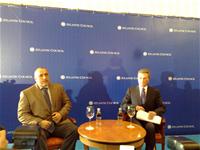 the interests, crossing over here in Sofia. I will remind you that from such a speech of ambassador Warlick 20 days ago, the news of a possible Bulgarian participation in the US missile shield plans in Europe popped up. Against the background of which several days later Russia seemed to have almost managed to impose its idea to fund the Belene project.
the interests, crossing over here in Sofia. I will remind you that from such a speech of ambassador Warlick 20 days ago, the news of a possible Bulgarian participation in the US missile shield plans in Europe popped up. Against the background of which several days later Russia seemed to have almost managed to impose its idea to fund the Belene project.
10 days later this doesn't seem that certain anymore and by the end of March (when Bulgaria has to respond to Russia) remains another month. But abrupt changes are unlikely to follow, given the clearly stated positions of the US and the European Commission yesterday. Only the question of transparency remains unsolved. Prime minister Boyko Borisov made the calculations about Belene like this:
"In a moment you have to sign 2 bn euro off and bury it in the ground where it is or to find another 2-3 bn, I hope minister Traykov knows how much exactly, so that we could continue the construction".
And here it is where the key to the plant is buried - in the price. How much so far, how much later, how much it would cost in 10 years and will the plant be necessary in the future (given the consumption, the production of renewable energy sources and the common EU strategy), how much the electricity from the station would cost and are their potential buyers? Unless these facts are announced and publicly debated, Belene will continue to be a geopolitical and not an economic dispute. As the prime minister Boyko Borisov put it very well:
"Those are the ruthless realities, all the rest is populism".
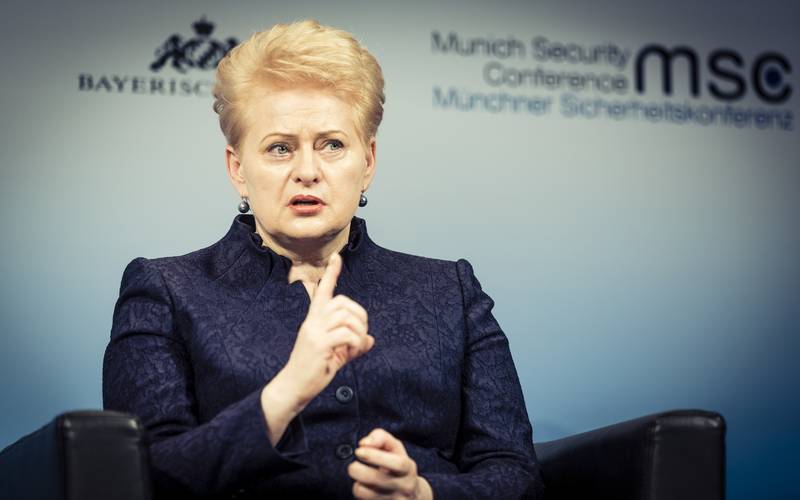 Dalia Grybauskaite | © MSC/Koerner
Dalia Grybauskaite | © MSC/Koerner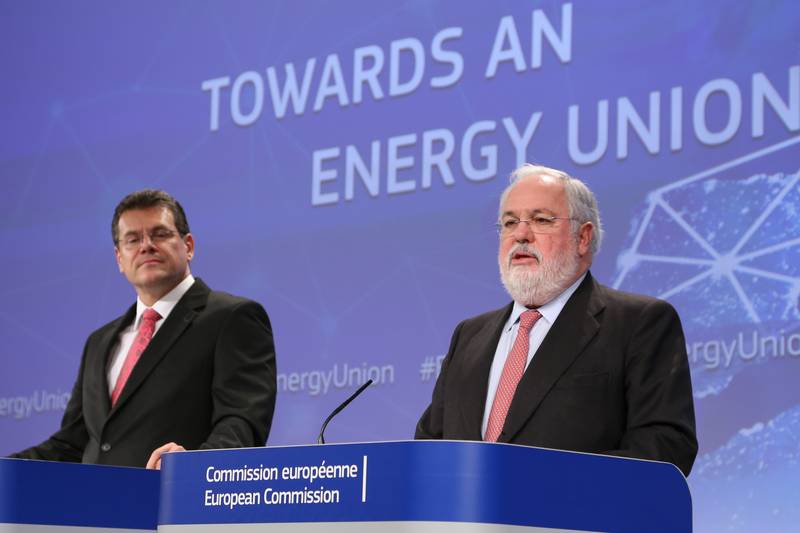 Maros Sefcovic, Miguel Arias Canete | © European Commission
Maros Sefcovic, Miguel Arias Canete | © European Commission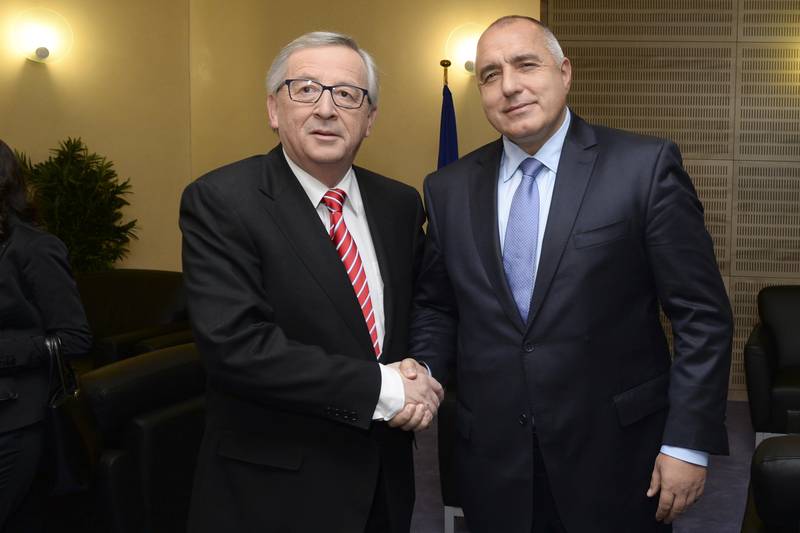 Jean-Claude Juncker, Boyko Borissov | © European Commission
Jean-Claude Juncker, Boyko Borissov | © European Commission